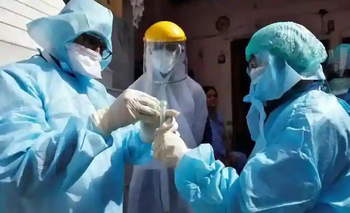The RT-PCR test amplifies the virus’ genetic material (RNA) from throat swabs of the patients, converts it to DNA, amplifies it and checks it for designated markers to see whether it is the Sars-Cov-2 virus, which causes Covid-19.
A start-up from Indian Institute of Science (IISc) is in the process of validating a new two-step method for RT-PCR testing that can help India scale up molecular testing for the coronavirus disease (Covid-19).
The RT-PCR test amplifies the virus’ genetic material (RNA) from throat swabs of the patients, converts it to DNA, amplifies it and checks it for designated markers to see whether it is the Sars-Cov-2 virus, which causes Covid-19.
The method devised by the IISc team uses two machines, which are cheaper and readily available in India, instead of one, to complete the test.
A thermal-cycler is used to amplify the genetic material machine, while a fluorescence reader .
The robot is thoroughly sanitised after each round of duty. Nightingale is inspired by robots used by the health department in Wuhan, China, according to the developers is used to detect the presence of Sars-Cov-2 virus..
Currently, India does about 25,000 RT-PCR tests a day. The testing is likely to go up with the much awaited consignment of 5 lakh rapid blood-based antibody tests arriving from China on Thursday. India has also started manufacturing its own antibody kits.
“RT-PCR is the gold standard of tests, it can detect the presence of the virus in the body from day one, but there are very few RT-PCR machines across the country. They are also expensive. The method we have developed uses a thermal cycler, which is more readily available in biology labs,” said Arun B, director, Shanmukha Innovations, the IISc start-up.
At IISc, there are about 30 RT-PCR machines in comparison to 200 thermal cyclers. There are about 186 government laboratories with the RT-PCR machines that have now been approved for Covid-19 tests..
“RT-PCR is the golden standard of tests, as it can detect the presence of the virus in the body from day one. But there are very few RT-PCR machines available in the country. They are also expensive. Our method uses a thermal cycler, which is more readily available in biology laboratories,” said Arun B, director, Shanmukha Innovations.
At IISc, there are about 30 RT-PCR machines, as compared to 200 thermal cyclers. There are about 186 government laboratories with the RT-PCR machines that have now been approved for Covid-19 tests.
“The fluorescence readers are used to measuring the DNA in samples and are available at several academic laboratories. It can also be manufactured at an estimated cost of Rs 1 lakh as opposed to about Rs 15 or Rs 20 lakh, which an RT-PCR machine costs. We have been working with this method for other diseases such as malaria and Kala-azar, now we need to validate the workflow for Covid-19,” said Arun.
Shanmukha Innovations is collaborating with the Bangalore Medical College and Research Institute to test round 100 samples using the traditional RT-PCR test and their two-step method to assess whether the results are as accurate. The team already has two prototypes.
“Once validated, the manufacturing can happen within six weeks,” he said.
The start-up is also working on a mobile laboratory – with bio-safety level (BSL) II – that can cut down on the testing time. “We have a few vans donated to us under the corporate social responsibility (CSR) scheme. We are working on these vans. We are fitting these vans with equipment and restructuring as a BSL II lab. Currently, there is at least a three-day lag between the time a sample is collected and a patient receives his report because all the samples have to be sent to the designated laboratories. Instead, we can now take the vans to the Covid-19 hotspots and conduct the tests directly on the spot. Around 12 samples can be processed within three hours,” said Arun.
Each van is likely to cost around Rs 45 lakh.


 May 25, 2020
May 25, 2020